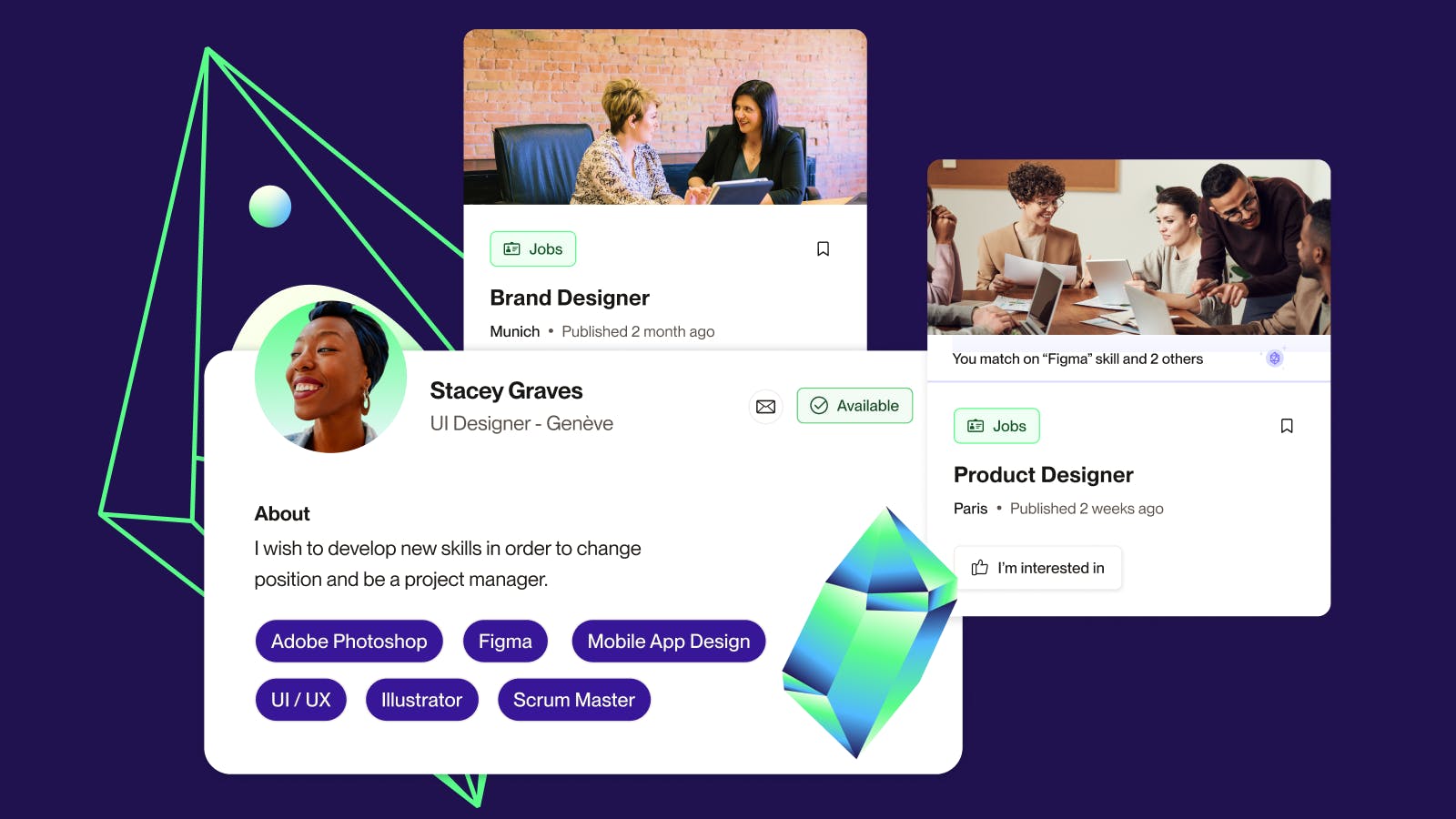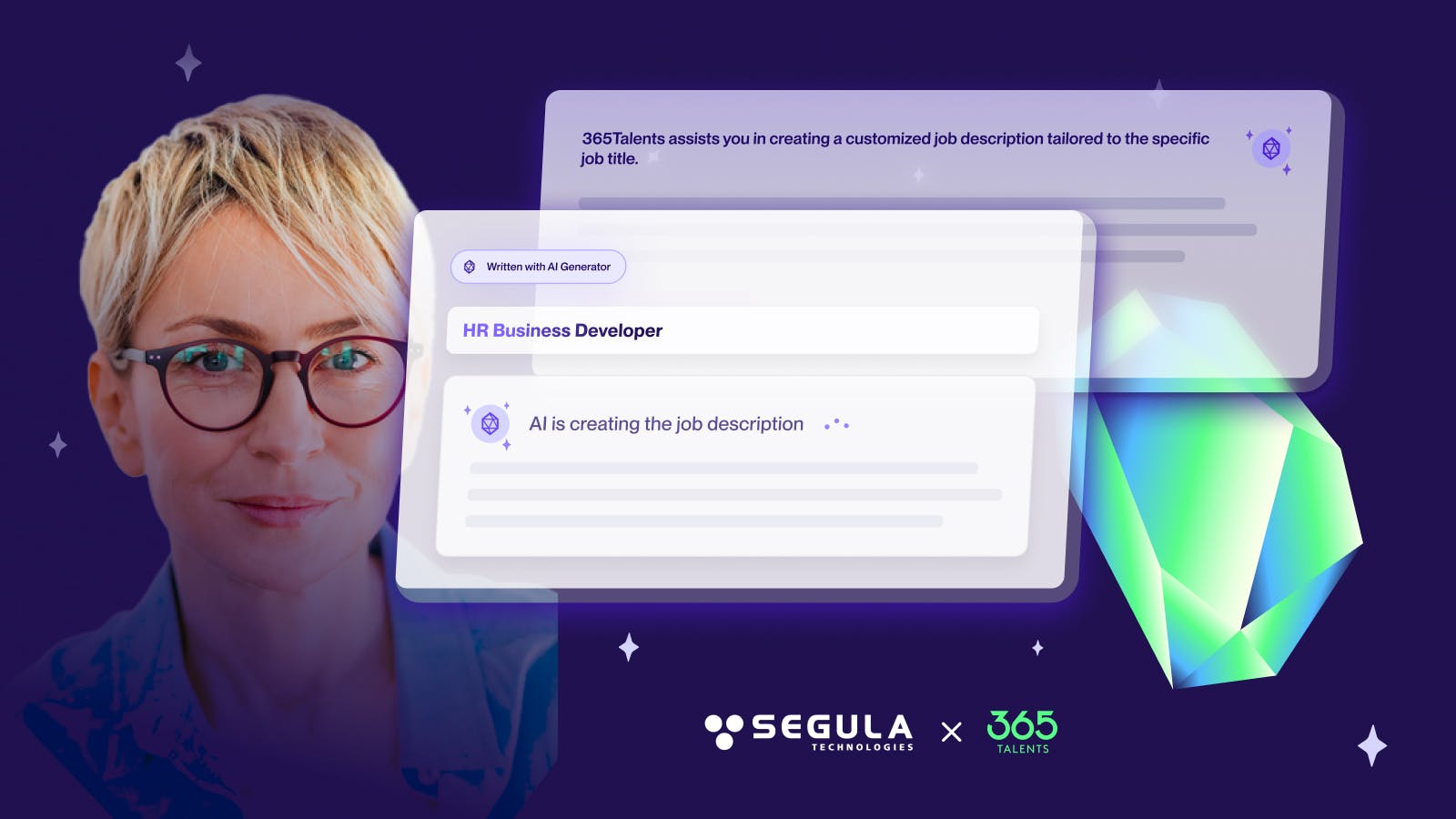How AI is revolutionizing and empowering SBOs
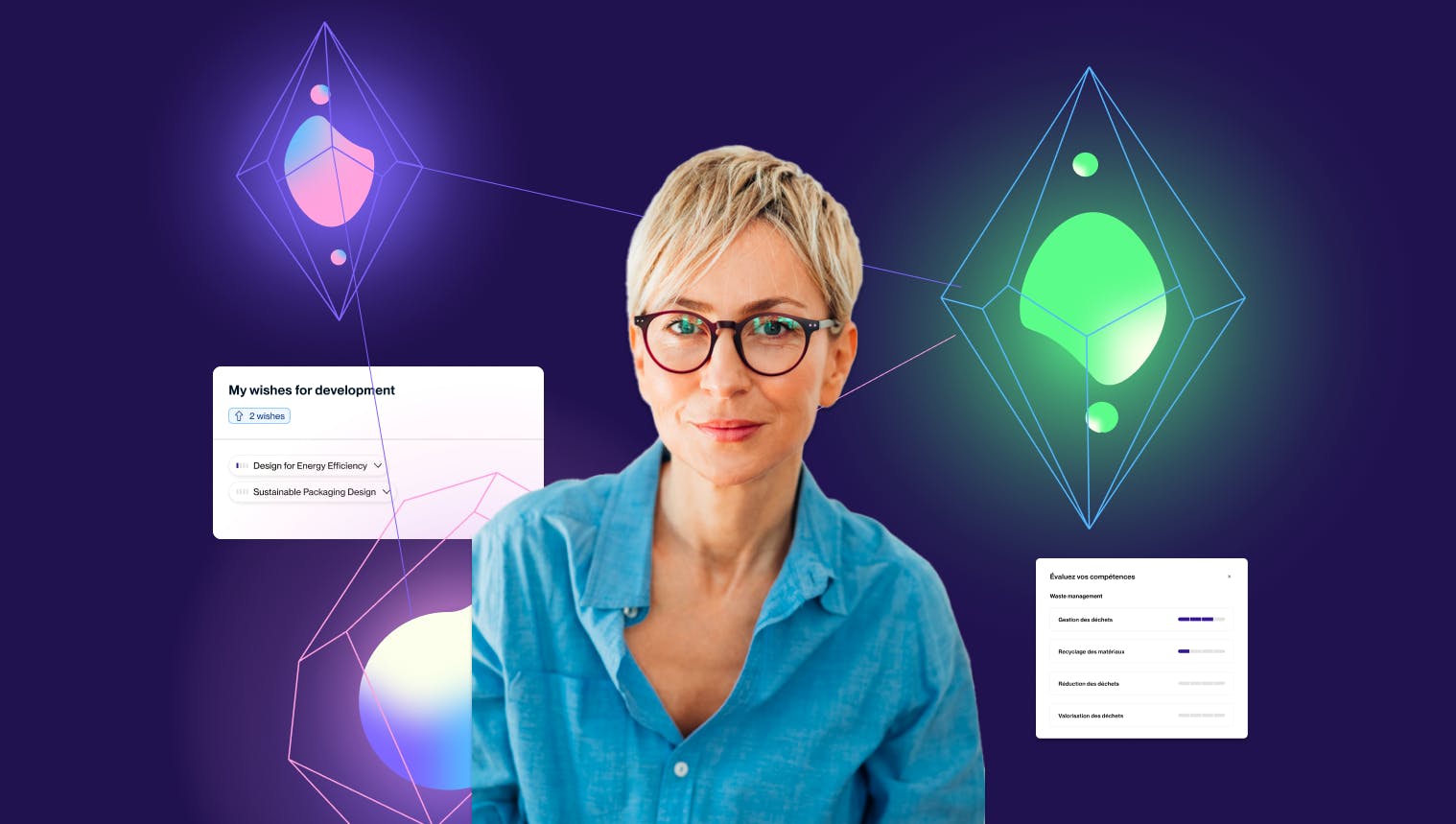
We know how powerful AI can be in transforming the way organizations work. But how does it apply for skills-based organizations?
AI is enabling them to flourish in an era where skills are paramount. By utilizing AI's transformative capabilities, SBOs can unleash previously untapped potential, stimulate innovation, and adeptly navigate the intricacies of the contemporary workforce with exceptional adaptability and foresight. Read more.
What are the benefits of AI for HR and Skills-based organizations?
AI, or artificial intelligence, is spearheading a monumental shift in the landscape of Skills-Based Organizations (SBOs), propelling them toward unprecedented levels of talent management, efficiency, and innovation. As SBOs look at employees’ skills first rather than their jobs, AI can provide insights and data to empower strategies based on skills. Here's how:
Optimized talent matching: AI algorithms analyze vast pools of skills data, enabling SBOs to pinpoint ideal matches between projects and individuals based on skill sets, experience, and potential. This facilitates the discovery of hidden talents and promotes a culture of meritocracy within the organization.
Personalized learning and development: AI-powered platforms deliver tailored learning experiences to employees, addressing skill gaps and nurturing professional growth in alignment with organizational objectives. Through adaptive learning paths and real-time feedback, employees can continuously upskill and reskill, fostering a workforce that remains agile and future-ready.
Predictive analytics for skills development plan: By harnessing predictive analytics, AI forecasts emerging skill trends and anticipates future talent needs. This foresight enables proactive talent planning, ensuring that SBOs are equipped with the requisite skills to thrive in an ever-evolving business landscape.
Data-driven strategic decision-making: AI analyzes vast quantities of skills data to provide actionable insights for strategic decision-making. From identifying emerging skill gaps to forecasting future talent needs, AI empowers HR leaders with the knowledge to make informed, data-driven decisions that drive organizational success.
Enhanced diversity and inclusion: AI mitigates unconscious biases in talent management processes by focusing solely on skills and performance metrics, thus promoting diversity and inclusion within SBOs. By eliminating subjective criteria, AI-driven decision-making fosters a culture of fairness and equal opportunity.
Streamlined workflow automation: AI automates repetitive administrative tasks, liberating HR professionals from mundane activities and allowing them to focus on strategic initiatives. This not only boosts operational efficiency but also frees up time for HR leaders to invest in cultivating a skills-first culture across the organization.
Skills hub: the center of your skills-based organization’s strategy
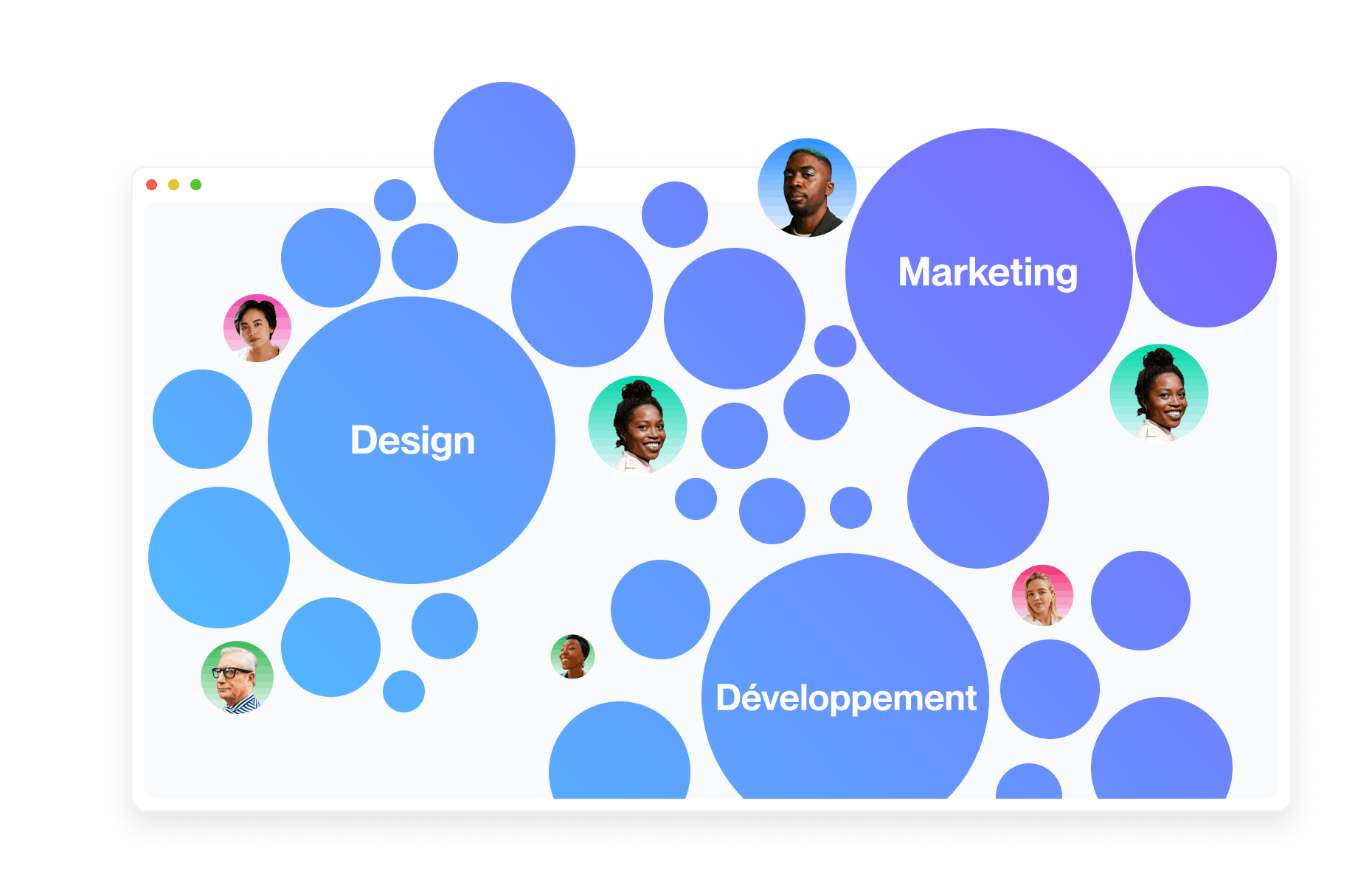
Share a skills-based talent vision across your company:
The switch from a jobs-driven to a skills-based strategy embraces “skills-first” as a mindset more than simply an approach. While strategy and approach can be directed top-down, mindsets come from within and, at scale, enjoy the unique power of a grassroots movement. It requires a shared outlook across the organization regarding the value and prioritization of skills “as the connecting thread of talent management” and how they will direct all workforce decisions.
To do this, you need to deeply understand, internalize, and communicate the value of skills so that your company adopts it not just as a strategy, but as a way of thinking about the world of work.
And it seems like it works, as 63% of business and HR executives already say their organization’s business and HR executives are aligned on the importance of skills in making decisions. It is now easier for companies to understand and implement this skills-based talent vision.
Establish skill governance:
Skills governance is skills management at the global level, and represents both the overarching principle and the organizational structure that dictates how the company will strategically address skills management.
In essence, skills governance is the “who” of skills management, which can either be centralized or decentralized. Who will own the transformation to a skills-based organization? The CHRO and the HR team largely lead centralized skills governance. While this has advantages, it can prove challenging for implementation if the strategy needs to be better understood or communicated to business leaders and stakeholders in each business division or geography.
Decentralized skills governance is when leaders lead skills management from each business line. Similarly, advantages exist here (such as subject matter expertise), but may need to gain the big-picture vision and strategy that HR contributes.
The best approach for most organizations is a hybrid skills governance, where skills management is centralized on a technological level for strategic vision and driven by an influx of real-time internal data on the business. But decentralized operationally with insights shared back to each business leader and business line to guide everyday plans and operations.
This transformation goes beyond HR, as “90% of business and HR executives say moving to a skills-based organization will require a transformation for all functions and leaders, not just HR. “
Capture and manage skills data
Skills data is essential in every HR process, more specifically when creating a skills hub. This information provides HR teams with an overview of the current skill sets within their organization, informing:
- Who to hire: if a candidate has the necessary skills to add to the team’s existing skill set and close any known skills gaps.
- How much to pay them: the candidate or employee’s position within the salary grid based on their skills and competencies.
- Who to promote: if an employee has upskilled and is now eligible to progress into a new role.
- How and where to deploy skills across the organization: leaders can distribute relevant talent into new roles or specialized projects based on skills.
- How to grow our business: tracking skills enable decision-makers to plan expansion into new business areas or markets.
Fortunately, there are some fantastic tools powered by AI to help you gather all your skills data into one place of truth.
Skills data powered by technology
New technologies arrived on the market with AI-powered skills assessment and frameworks, making SBOs success possible. HR softwares based on skills match competencies to work, career opportunities, teams, and learning. It analyses skill gaps from all data collected to inform HR teams and managers what skills they need to develop or hire (internally or externally).
How AI collects skills data and analytics for SBOs
Why skills data is important for SBOs
When it comes to skills-based organizations, data and analytics play a pivotal role in fueling them, with a focus on leveraging individual competencies to drive organizational success.
Data analytics can help organizations pinpoint areas where specific skills are lacking or outdated. By analyzing employee performance, feedback, and training outcomes, HR teams can identify skill gaps and prioritize areas for development. Organizations can also personalize training programs to address the specific needs of employees. This targeted approach ensures that resources are allocated efficiently, leading to enhanced skill development and performance improvement.
Last but not least, data analytics can provide valuable insights into employees' career aspirations, strengths, and areas for growth. By leveraging this information, organizations can offer tailored career development opportunities that align with individual skills and goals, increasing employee engagement and retention. It is also easier for HR teams to gain insights from industry trends and market demands, and compare them to internal skills data to forecast future skills requirements.
For example, an AI specialized in skills data can give great insights into what skills the company has, what skills their employees need to execute their roles better and be more effective, and what skills are trending on the market so they can bridge existing gaps. As a result, HR can then adapt their skills and talent development strategies on top of developing new learning and training plans.
More specifically, the rise of generative AI democratizes access to analytics, information, and skills across roles, personalizing skills development and career paths, and improving the employee experience as a whole.
How does it work?
HR technologies and AI tools can gather all your skills data through some tools and processes such as:
Skills Mapping and Identification:
AI algorithms excel at parsing through vast amounts of data to identify and map skills within an organization. By analyzing employee profiles, project histories, and performance metrics, AI can accurately identify existing skills and potential skill gaps.
Personalized Learning and Development:
AI-powered platforms provide personalized learning paths tailored to individual employee skill profiles and career aspirations. By leveraging machine learning algorithms, these platforms recommend relevant training programs, courses, and resources to help employees upskill and reskill effectively.
Predictive Analytics for Talent Management:
AI enables HR professionals to harness predictive analytics for talent management. By analyzing historical data on employee performance, career progression, and skill acquisition, AI algorithms can forecast future skill needs, identify high-potential talent, and predict attrition risks. This foresight allows organizations to proactively address skill shortages, succession planning, and talent retention strategies.
Skills Matching and Talent Mobility:
AI facilitates skills-based matchmaking by identifying hidden talents and transferable skills within the organization. Through intelligent algorithms, employees can discover internal opportunities aligned with their skill sets, promoting talent mobility, internal career growth, and organizational agility.
Automated Skills Assessment and Feedback:
AI streamlines the skills assessment process by automating the evaluation of employee skills through various methods, such as self-assessments, peer reviews, and performance data analysis. Real-time feedback generated by AI algorithms enables employees to track their skill development progress and receive targeted recommendations for improvement.
Augmented Decision-Making for HR Professionals:
AI-powered decision support systems assist HR professionals in making informed decisions regarding talent acquisition, workforce planning, and skills optimization. By analyzing data from multiple sources, including resumes, performance reviews, and market trends, AI provides actionable insights to enhance recruitment strategies and talent retention efforts.
Continuous Skills Monitoring and Adaptation:
AI enables continuous monitoring of skills dynamics within the organization, allowing HR professionals to adapt quickly to changing skill requirements and market demands. By leveraging real-time data analytics, organizations can stay agile, responsive, and competitive in the face of evolving skill landscapes.
AI is revolutionizing skills-based organizations by providing advanced capabilities in skills mapping, personalized learning, predictive analytics, talent matching, automated assessment, decision support, and continuous monitoring.
Some skills-based experts exist on the market to help SBOs to reach success easier. 365Talents, for instance, works in 3 important phases:
- Build the business case for your skills: the good methodology will help to define your business priorities and use cases, and the right experience enables you to invite and engage your teams to create momentum. This is the starting point for your SBO transformation.
- Identify your needs: our solution and experts enable you to consolidate your skills and job frameworks by structuring and organizing them. It’s key for the future of your project.
- Manage the transition and change: change management is really important for a clear transformation. Our solutions can help you manage this transition with skills harmonization and seamless integration with your HRIS tools. You’ll be able to seamlessly incorporate skills into your HR practices.
These 3 steps allow organizations to change at scale by including their HR team, managers and employees on the transformation journey.








Choosing the right Skills Tech tool
What is skills tech?
Skills tech zones in on the specific tools used to support employee learning and development, such as skills assessment and learning management systems. There is a degree of overlap, but essentially, skills tech is a specific area of your HR tech stack that will enable employees to acquire new skills and advance their careers.
Whatever HR tool you choose, your skills technology needs to operate on three levels:
- Employee engagement
- Offer-and-demand matching
- Decision-making
You need a tool that identifies and captures the skills expressed across multiple solutions and sources, centralizing this data into strategic frameworks, actionable insights, or matching/staffing suggestions. Meanwhile, your employees can enjoy a more personalized HR experience thanks to intelligent career, opportunity, and skills suggestions for their professional future.
It starts with:
1) Gathering existing data from various departments and roles, with AI.
2) Centralizing all this data in a unified tool, enhancing organization and visualization.
3) Elevating the system by adding intelligence with new insights, which can be related to employees, market benchmarking, or other aspects. Make your goals attainable with smart technology designed for talent marketplace, career planning, and analytics, highlighting essential skills and skill gaps insights for data-driven decisions.
[The skills technology you bring to your company] has to be intelligent and agile enough for your employee engagement. [Your employees] have to be able to engage, fill in information, and express themselves the way they want.
LOÏC MICHEL
,365Talents CEO and co-founder
What Skills Intelligence Solutions can do
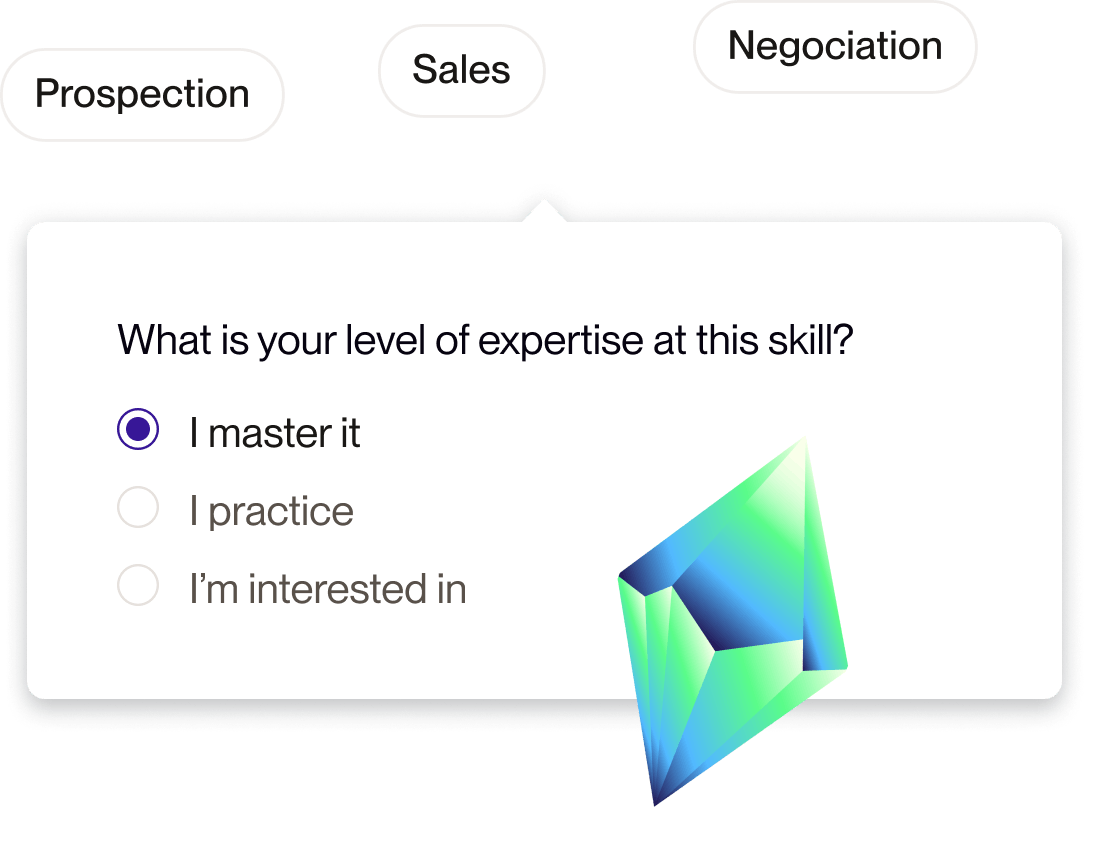
Skills Intelligence solutions enable you to build a dynamic and personalized skills framework to get better visibility on your current workforce and build the one of tomorrow, which is crucial for skills-based organizations. You can use them to:
- Extract and centralize all your skills data to build your skills and job frameworks
- Dynamically enrich your skills frameworks with your employees, offers, job data, and market insights
- Intelligently match skills between employees, jobs, projects, learning opportunities, mentors, etc.
- Recommend personalized learning, and career paths based on skills and interests
- Analyze gaps and trends at individual, team, and organizational levels
How 365Talents’ AI, fueled by Skills Intelligence, helps SBOs to thrive
Our Talent Experience solutions are fueled by skills intelligence and are the right tools for SBOs that want to thrive.
365Talents helps you create unique, accurate and concise skills frameworks that align with your organization's specific skills context and culture. The frameworks are designed to be precise, tailored to the particular abilities of your employees, constantly updated to meet HR use cases and stay in sync with the latest market trends. They are also designed to be dynamic, operating seamlessly within the flow of work, making them an invaluable tool for HR professionals. Most importantly, skills data should be accessible to all other HR processes and systems, serving as a common language for Talent Management and Talent Experience.
To achieve these objectives effectively, we use both top-down and bottom-up approaches to help you build a specific skills framework. Imagine it like a Tetris game board, your framework is a fusion of various sources that through smart and strategic interpretation and manipulation, can be fit together for a seamless, rock-solid view of your company’s current skills.
No matter the shape, size or quantity of the skills data you currently have, we can integrate additional data or complement it with our frameworks, filling in any gaps you might have while mirroring your historical approach.
Once everything is live, you’ll have your centralized and dynamic skills framework. Our technology takes over, performing automatic categorization, synonym detection, semantic matching, language detection, and automated translation, providing you with a unique and unparalleled visibility of your workforce.
To learn more about AI capacities, read this resource!
AI is not merely revolutionizing SBOs; it's empowering them to thrive in an era where skills reign supreme. By harnessing the transformative power of AI, SBOs can unlock untapped potential, foster innovation, and navigate the complexities of the modern workforce with unparalleled agility and foresight. They are able to optimize talent management practices, foster a culture of lifelong learning, and drive sustainable growth in today's dynamic business environment.
Read more resources...








